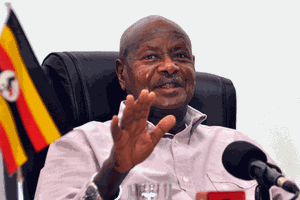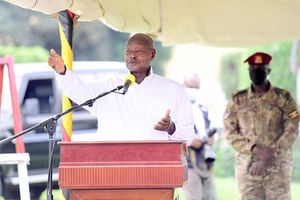
President Museveni
President Museveni, for the nth time in his 38-year rule, has lately been making threatening noises against the corrupt. A few Members of Parliament have been dragged to court, in an act that some see as “just pro forma”.
The Big Man might have left it too late, and not many believe him. Corruption in Uganda, they say, has become too big to fail.
There are a few people who have got a master of this country, and I know that many of us who write or research on Uganda, still run to them to test out their ideas.
I reached out to one of them, now truly a grandee, to check out his thoughts about whether he thinks a serious campaign against corruption was on.

Bidandi Ssali
Perhaps not surprisingly, he wasn’t impressed: “The corrupt horses bolted from the stables ages ago. They have multiplied. What were two or three horses is now a herd of 1,500 horses. You can’t lock them back in a stable built for 10 horses”, he said.
He added: “Museveni is like the headmaster whose stubborn children go to the school he heads. He is disciplining other children and not his own. It presents a serious dilemma for the teachers, and harms his credibility.”
We spoke about how and why the battle was lost, and what possibilities remained to reform the Ugandan state and governance. Also, if there were any good guys and girls left in government and politics, and what difference they can make.
The latter issue brought up for me the criticism made against anti-corruption activists and critical journalists; that they are “making cheap noise from outside”, and a worthier path would be for them to go “and reform the system from within”.
It is a question as old as the hills. And I lived it the hard way.
I remember the year. It was late 1988, and still the heady euphoria days of a new National Resistance Movement (NRM) government and a sprightly President Museveni. After two years of a failed state-controlled economy, the NRM swung full circle and launched Africa’s boldest free market and economic liberalisation reforms.
I was (and remain) a big and unapologetic supporter of the reforms, and wrote regularly in a short 300-word column called “In A Few Words” in the now-extinct Weekly Topic, making the case for them.
But I was also a little infatuated with freedom, perhaps because I was too young a man, with no serious responsibilities in the world. I argued for free politics and against the NRM’s no-party system.
I wrote for sexual freedom and the decriminalisation of prostitution. I wanted the use of marijuana legalised. That early, corruption and nepotism were creeping into the Museveni government, and Weekly Topic was on it. I decried the rot in my little column.
The publishers of Weekly Topic, former Uganda Patriotic Movement (UPM) politicians and activists with Museveni, had all joined the NRM government. But Bidandi Ssali, Kintu Musoke, and the late Kirunda Kivejinja remained democrats and progressives.
We would have long debates with them about our reporting of corruption in NRM, which was causing them a lot of trouble. Sometimes they pushed back and we relented. But many times, we had our way.
I remember that Kintu Musoke began chiding me, calling me an “angry young man”, and teasing me that “if you were the President, I am sure you would lead a protest against your government”.

Kirunda Kivejinja
I should have suspected that something was afoot. In late 1988, I travelled to a big conference on freedom of expression in Tunisia’s capital Tunis. It ended in disaster. Salman Rushdie had just published his controversial “Satanic Verses”, and the Ayatollah of Iran, Ruholla Khomeini, had issued a fatwa against him, demanding his execution for blasphemy.
I had bought a copy of the book on my travels and read it. Being a conference on freedom of expression, I took the microphone to defend the book and made the mistake of wondering how many critics in the room had even read it. I was thrown out of the conference.
I returned to Kampala bruised. When I got back to the office, I found a letter appointing me director of a board of a state parastatal. I jumped on the phone with Bidandi Ssali and Kintu Musoke, and they both told me the same thing: “Go and try to change things from the inside. You can’t be a critic from the outside all the time.”
So, I did. I was the only one who never wore a suit on the board. I sat there, outspoken, with wild hair, in khaki trousers and, a khaki jacket, and I had a shoulder bag when everyone else was carrying a proper business briefcase.
It was a good board, though, with clever, decent fellows. We made a lot of changes to the fortunes of the parastatal and got it out of debt, but we weren’t profitable. It needed a sharp rationalisation, and to get rid of the bloated staff.
Though I was the youngest person on the board by almost 15 years, because I was the only one employed in the private sector and was loudest about having a “lean and efficient organisation”, I was given the task of heading the reform committee.
Our report recommended cutting down the staff size by almost 25 percent. And we drew up a list. On the list was a departmental head who was the second wife of a deputy prime minister in the government. There was also a head technician who was related to a minister.
When we presented our report, it found its way to the ministry. We were told we couldn’t touch the Deputy PM’s wife and the technician. The matter came back to our committee and, as chair, I held my ground.
This chapter of my public life, ended, as it had started, with a book. In 1987, Paul Kennedy’s 677 pages stirring, The Rise and Fall of the Great Powers, was published and from mid-1988 caught fire.
That was well before the internet, before Amazon, and Kampala was still a bit of a backward post-war city; so, there was no way to get it in town. But on the British Broadcasting Corporation (BBC), reporting and conversations about the book was raging.
Courtesy of Prof Mahmood Mamdani, I used to get copies of “The International Herald Tribune” a week later, and the debate was hot there about Kennedy’s book. Early in 1990, I travelled to London and finally got a chance to get the book. I bought two copies.
I carried my copy to the office for a triumphant reveal when I returned to Kampala. I pulled it out of the bag and placed it on the desk where a couple of letters waited for my attention. One of them was from the line ministry responsible for the parastatal where I was director.
It was a short terse note from the Permanent Secretary, saying he had been instructed by the minister to revoke my appointment to the board immediately.
I was the only member who had been axed from the board, and it was for my obduracy over the retrenchment of a deputy prime minister’s wife.
When I looked on the side and saw Kennedy’s book, I chuckled. I was the power that had fallen. I learnt the hard way the limits of “fighting from inside”.
I suspect I had also made a tactical mistake. The board rules were clear about directors’ benefits. We would be paid a sitting allowance and a transport refund to the meetings.

Kintu Musoke
Our chairman was a nice chap, but he was given to taking liberties. He started driving a company car, which the company fueled. The rest of the board was uncomfortable, and we discussed it among ourselves. No one offered to do anything.
At a board meeting, I bit my tongue and called out the chairman over his irregular use of a company car and added, for good measure, that it was undermining our reform efforts.
If I hadn’t been felled on the first count, I would have been on the second. When the call came to the chairman, he was all too happy to serve my head up.
Maybe I shouldn’t have picked to fight on two fronts. I should not have confronted the headmaster or his child. I should have been content to take down the lesser children. But that would have been morally hollow.
I left in my khakis. The parastatal went down the tubes. Years later it was handed back, as a shell, to the pre-Amin era owner. He brought it back to life. It was the power that rose.
That might well be Uganda’s fate. I fear its rampant corruption might only be expunged in a post-Museveni order.





